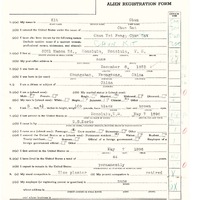 Alien Registration Form for Kit Chun (1940) Alien Registration Form for Kit Chun (1940) |
|
The Alien Registration Act of 1940 required all non-citizens entering and living within the U.S. to register their alien status with the government by completing an Alien Registration Form. The AR-2 form included a questionnaire and a requirement that fingerprints be taken at the time of registration. This act, also known as the Smith Act, was written to address concerns about subversive activities on the eve of American involvement in World War II.
|
 Cable Act (1922) Cable Act (1922) |
|
The Cable Act was a federal law that repealed the Expatriation Act, restoring United States citizenship to American women married to foreigners. The act reflected early goals from newly-won women's suffrage.
|
 Constitution of the Hawaiian Kingdom (1840) Constitution of the Hawaiian Kingdom (1840) |
|
In this constitution, King Kamehameha III relinquished his absolute powers as ruler and established the equality of his subjects before the law.
|
 Constitution of the Hawaiian Kingdom (1887) Constitution of the Hawaiian Kingdom (1887) |
|
Known as the Bayonet Constitution, King Kalākaua was made to sign the document under the threat of violence by an armed militia backed by a secret society which aimed to overthrow the Kingdom of Hawaii. The Constitution placed significant limitations on the power of the monarchy and stripped Native Hawaiians of rights in favor of white non-citizens.
|
 Hawaii v. Mankichi (1903) Hawaii v. Mankichi (1903) |
|
Hawaii v. Mankichi is one of a series of cases decided by the Supreme Court addressing the status of U.S. territories known as the Insular Cases. This case considered the extent to which the Constitution should apply to Hawaii and how the new territory's previous legal codes could be folded into the laws of the Territory of Hawaii.
|
 Immigration and Nationality Act of 1952 Immigration and Nationality Act of 1952 |
|
Also known as the McCarran–Walter Act, this act of Congress retained the national origins quotas for controlling immigration, but granted immigration quotas to all countries and removed racial restrictions for naturalization.
|
 Jones Act (1920) Jones Act (1920) |
|
The Jones Act established that all interstate shipping must be conducted on ships that are owned and operated by United States shipping. This act claims to protect national security, but it also makes shipping to U.S. territories and Hawaii more expensive than international shipping.
|
 Ozawa v. United States (1922) Ozawa v. United States (1922) |
|
The Supreme Court found in Ozawa v. United States that Japanese immigrants were not eligible for naturalization, based on a contested category of whiteness. The case considered the meaning of "free white persons" from the 1906 Naturalization Act and whether factors like assimilability should be considered. While the court determined in Ozawa that the words "white person" were meant to indicate a person of the "caucasian race," the decision in U.S. v. Thind just months later stated that the word "caucasian" was meant to refer to the "common understanding" of race and not a scientific one.
|
 The Insular Cases and Contested Citizenship The Insular Cases and Contested Citizenship |
|
This teaching module discusses the intersection of U.S. colonial power and migration, featuring a webinar with Robert McGreevey, author of the 2018 book, Borderline Citizens: The United States, Puerto Rico, and the Politics of Colonial Migration.
|
 Trump v. Hawaii (2018) Trump v. Hawaii (2018) |
|
In this case, the Supreme Court ruled that the travel ban instituted by President Trump's Executive Order 13780 was within presidential power granted by Section 212(f) of the Immigration and Nationality Act of 1965.
|
 Webinar - The Insular Cases and Contested Citizenship (2024) Webinar - The Insular Cases and Contested Citizenship (2024) |
|
In this webinar, Professor Robert McGreevey of the College of New Jersey discusses the intersection of U.S. colonial power and migration with Dr. Jeannette Eileen Jones and her And Justice For All class.
|
 Alien Registration Form for Kit Chun (1940)
Alien Registration Form for Kit Chun (1940) Cable Act (1922)
Cable Act (1922) Constitution of the Hawaiian Kingdom (1840)
Constitution of the Hawaiian Kingdom (1840) Constitution of the Hawaiian Kingdom (1887)
Constitution of the Hawaiian Kingdom (1887) Hawaii v. Mankichi (1903)
Hawaii v. Mankichi (1903) Immigration and Nationality Act of 1952
Immigration and Nationality Act of 1952 Jones Act (1920)
Jones Act (1920) Ozawa v. United States (1922)
Ozawa v. United States (1922) The Insular Cases and Contested Citizenship
The Insular Cases and Contested Citizenship Trump v. Hawaii (2018)
Trump v. Hawaii (2018) Webinar - The Insular Cases and Contested Citizenship (2024)
Webinar - The Insular Cases and Contested Citizenship (2024)